
Best Street Foods to Try in Beijing
China's passion for food – long in history as The Great Wall of China itself – is clearly manifested in its street food culture. This is particularly noticeable on the streets of Beijing, teeming with numerous vendors and thick with aromas. Whether you're a vegan, vegetarian or a passionate carnivore, it surely takes a great deal of "talent" to stay hungry in this city. Here are some of the not-to-be-missed snacks to try when strolling around the Chinese capital.
(To visit the venues mentioned in this article, check out these Self-Guided Walking Tours in Beijing)
1. Tanghulu ( or Bing Tanghulu, 糖葫芦 )
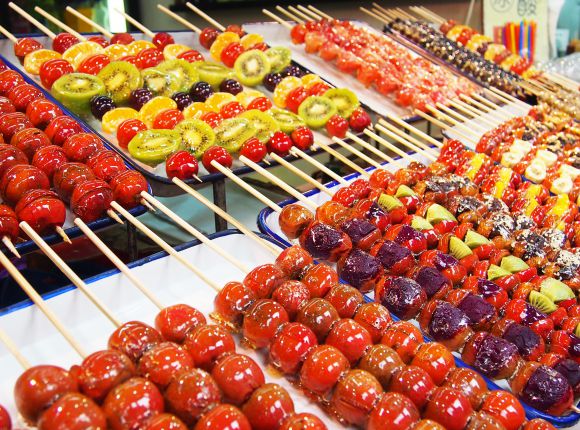.jpg)
Image Courtesy of: Joni Cong
Tanghulu, also known as Bing Tanghulu, is a typical winter snack for northern parts of China; Beijing is no exception. In essence, it is a "fruit kebab" featuring a mixture of fruits – usually, haw and Chinese hawthorn, but also, as of lately, mandarins, oranges, strawberries, pineapples, kiwi and other fruits added to the equation – stuck on a stick (20-30 centimeter long) and coated in hardened sugar syrup. Particularly loved by children, not only is it colorful (bright red or yellow), but also rather tasty (sweet-and-sour). Each year, as it gets colder, Tanghulu sales soar across the city with numerous street vendors selling it practically on every corner. If there's still a kid living inside you, go give him a treat!
2. Deep Fried Bread Twists ( or Youtiao, 油条 )
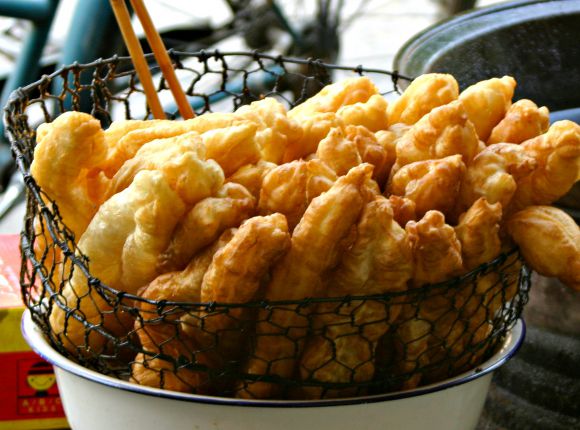.jpg)
Image Courtesy of: Brian Jeffery Beggerly
Youtiao is the Chinese answer to the doughnut challenge. The answer has proven quite successful, given the presence of this snack on Chinese McDonald’s menu alongside breakfast sandwiches. Contrary to its American counterpart, Youtiao has a long, twisted shape (so it can be easily torn lengthwise in two) and is served with sugar only optionally - specifically for those who want it. Traditionally, Bejingers prefer it with a pinch of salt and with a cup of hot soy milk. Well, tastes differ... Give it a bite and you will find Youtiao light and airy on the inside, while remarkably crispy on the outside. Crunch-crunch!!!
3. Lamb Kebabs ( yangrou Chuan’r, 羊肉串 )
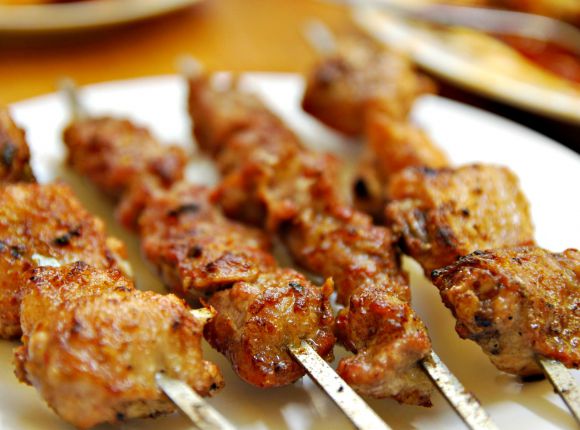.jpg)
Image Courtesy of: Alpha
Asian cuisine is hardly imagined without kebabs - small pieces of meat on skewers roasted over charcoal. In Beijing, however, they also make it deep fried in oil. Purest of all meats, lamb has always been No. 1 choice for street kebabs - in China, they call it Yanrou Chuanr (羊肉串). In recent years though, there have been more and more other meats present on the scene, such as chicken, pork, beef, and various seafood. For those not-fainthearted among tourists there are even weirder types of kebabs available, made of insects and bugs, as well as birds and other exotic creatures. To spice it all up, they usually apply cumin seed, dried pepper flakes, salt, and sesame or sesame oil (either sprinkled or brushed on). Still, even without spicing, such kebab experience alone can make your sense of adventure keen!
4. Steamed Bun ( Baozi, 包子)
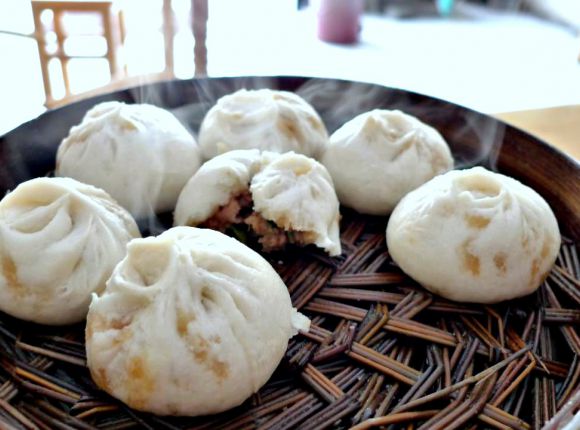.jpg)
Image Courtesy of: Drew Bates
Baozi is a typically Chinese grab-and-go stomach filler. In essence, it's a steam-cooked bun made of heavy white bread usually filled with meat. However, the actual variety of sizes and stuffing of Baozi can be infinite – from tiny little ones with see-through paper-thin dough to fairly large with thick-as-thieves coating filled with anything, from meat to brown sugar. The ones sold in Beijing traditionally come in satsuma sizes and stuffed with pork. Baozi vendors are easily recognizable on the streets by those bamboo steamers filled with piles of freshly-made buns waiting to be consumed.
5. Pan Fried Pancakes ( Jianbing, 煎饼 )
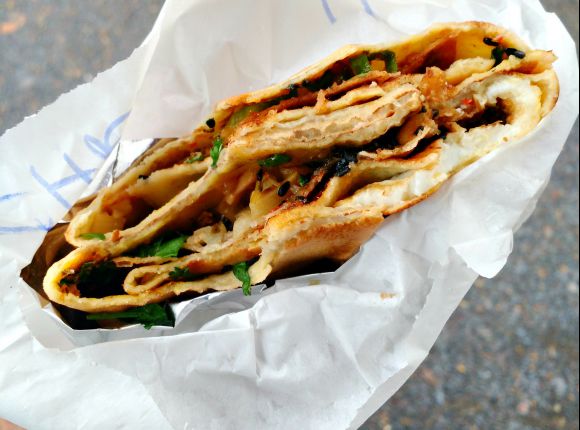.jpg)
Image Courtesy of: Ferrous Büller
If you're a pancake lover, expand your horizons, while in Beijing, and indulge yourself with this yet another local reinvention of something as flatly trivial as a pancake. In fact, this is more like a cross-breed between pizza and doner kebab. The mix is covered in egg and holds within a light, crunchy batter-like filling made of various things - sausage, spring onions, etc. On top of that comes a generous dollop of various sauces. Cooked before your very eyes, the "pancake" is handed over to you steaming hot and is best consumed right there on the spot. Jiān Bĭng vendors area easily spotted in the crowd, courtesy of their push carts which hold their stoves and all the necessary ingredients. Usually, they hang around near schools, offices, bars or at busy street crossings.
6. Beijing Sandwich ( Rou jia mo, 肉夹馍 )
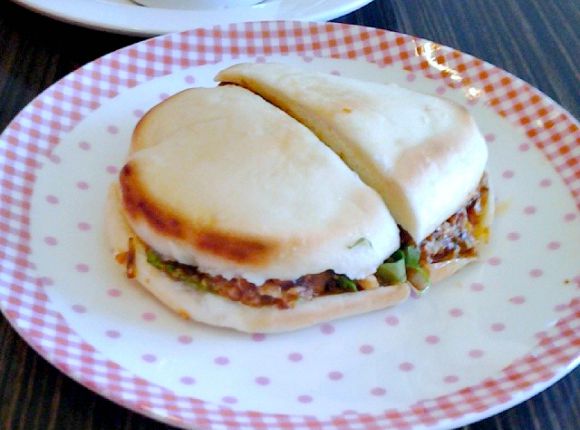.jpg)
Image Courtesy of: Gary Stevens
Roujiamo, also nicknamed “Chinese Hamburger” (yet “Beijingburger” would be more appropriate a term), is a pita bun filled with stewed meat. Each vendor of Roujiamo produces their own flavor which derives from their highly individualized cooking, spice mixing and drizzling recipies. Most often the meat is pork and stewed with chili, cumin, and the scorching Sichuan pepper. The meat stays simmering for hours in a soup laden with more than a dozen of spices and seasonings. However, some vendors produce “lighter” versions, using only a handful of spices, which, in turn, is something most people, unfamiliar with more flavourful Roujiamo, would hardly notice. Beware!!!
7. Tea Egg ( Cha Ye Dan, 茶叶蛋)
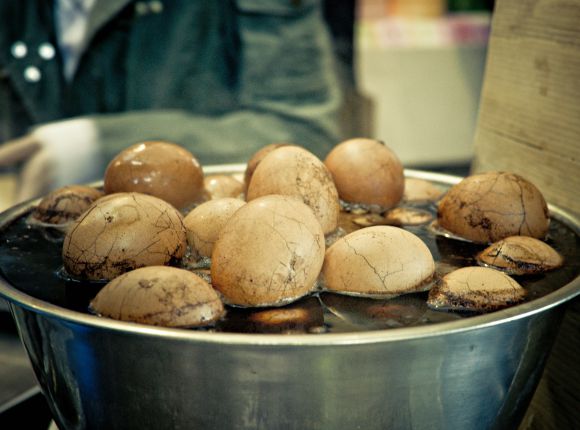.jpg)
Image Courtesy of: Joey
The Chinese are highly inventive with many things, and that might as well hold true for egg cooking. Tea egg is just one such uniquely Chinese invention that is widely appreciated as a snack on the streets of Beijing. As one would imagine, it involves an egg boiled in something similar to tea – a soup-like mixture of black tea leaves, soy sauce and spices. This gourmet snack is much loved by the locals for its cheapness and taste alike. When properly cooked, a tea egg reveals "marble painted" egg white which is equally pleasing to the eye as it is to the mouth.
8. Old-style Beijing Yogurt ( Lao Beijing Suannai, 老北京酸奶 )
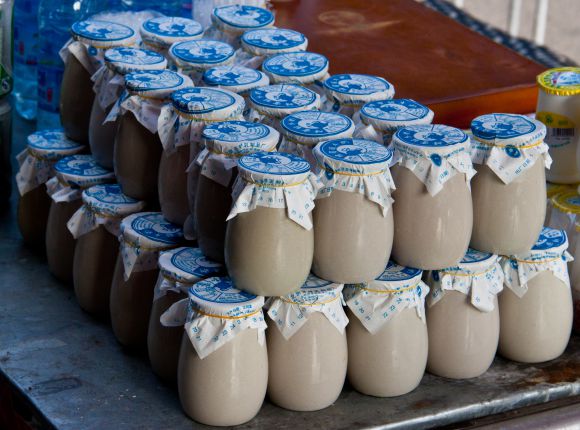.jpg)
Image Courtesy of: Nikolaj Potanin
What's known as the Old-style Beijing Yogurt is widely present today on the streets of modern Beijing. It has been successfully competing with the newly-emerged Western yogurt, although the two, yet similar in taste, are made rather differently. Beijing's Suannai (the original name) is produced from heated milk mixed with sugar, nuts, raisins, and rice alcohol. It is meant to be consumed instantly and, therefore, it is made and retailed fresh every day all over the city. So, next time you're in Beijing, look out for those cute little glass jars, so as not to miss the excitement. Afterwards, make sure to return the empty container to the vendor so it can be reused.
9. Deep Fried Insects

Image Courtesy of: Harvey Barrison
If you're an old hand with Chinese food and seen it all, tried it all, perhaps you might want to push it a bit further and wrap up your culinary experience of Beijing with some crunchy insects deep fried to a crisp. To find some of these, make way to Donghuamen Night Market or some other markets in Beijing and find there myriads of insects – scorpions, starfish, silk worms, dung beetles and others – caringly prepared and waiting to be savored. If your guts allow you to overcome the shock factor, just eat your way through. The fried insects aren't harmful to consume; it's just the matter of courage and sense of adventure to try them.
Get GPSmyCity App for IOS or Android
You can read offline thousands of travel articles like this one in the "GPSmyCity: Walks in 1K+ Cities" app on Apple App Store or Google Play Store. The apps also offer city offline maps and GPS navigation to guide you to the places featured in the articles.
Walking Tours in Beijing, China
Create Your Own Walk in Beijing
Creating your own self-guided walk in Beijing is easy and fun. Choose the city attractions that you want to see and a walk route map will be created just for you. You can even set your hotel as the start point of the walk.
Beijing's Historical Temples Tour I
Chinese temples are of unique beauty and have withstood many dynasties. However because the temples have always been connected to the imperial families, many of them were destroyed when the last dynasty ended in 1911. Nevertheless, a great number of beautiful temples with great history still stand in Beijing. Take this self-guided walking tour to discover a few famous temples in the northern part... view more
Tour Duration: 1 Hour(s)
Travel Distance: 0.9 Km or 0.6 Miles
Tour Duration: 1 Hour(s)
Travel Distance: 0.9 Km or 0.6 Miles
Olympic Park Walking Tour
The Olympic Park in Beijing was built for the Olympic and Paralympic Games of 2008. This modern complex represents a contemporary architectural approach as compared to the more traditional buildings that dominate the city. Among its signature items are the iconic Bird's Nest, otherwise known as the main Olympic stadium, and the beautiful Water Cube – the Aquatics Center for water sports.
... view more
Tour Duration: 2 Hour(s)
Travel Distance: 5.6 Km or 3.5 Miles
... view more
Tour Duration: 2 Hour(s)
Travel Distance: 5.6 Km or 3.5 Miles
Beijing's Historical Temples Tour II
The places of worship are some of the best links to the city's history. The unique churches, Buddhist and Taoist Temples, and beautiful Muslim Mosques all tell great tales of the history of Beijing. Despite that many of them have been partially or completely destroyed over the years either by wars or by the changes of political power, a good number of them still remain. You can visit a few... view more
Tour Duration: 1 Hour(s)
Travel Distance: 2.1 Km or 1.3 Miles
Tour Duration: 1 Hour(s)
Travel Distance: 2.1 Km or 1.3 Miles




